
Demi Rivera is an autistic licensed cosmetologist who runs a Denver hair salon that accommodates autistic children and adults, as well as those with ADHD, sensory processing disorder or other needs.
Whether your child or you are on the Autism Spectrum, Demi will make sure that any and all sensory needs are adjusted for while she performs her expert hairstyling services.
Yes, there are other hair salons in the Denver Metro area that emphasize inclusivity.
But a welcome mat by neurotypical stylists is not enough when it comes to some children and adults who have a diagnosis of Autism Spectrum Disorder.
“In order for someone to truly understand the autistic experience, they need to BE autistic,” says Demi, 28, who was diagnosed with ASD at 25.
“This goes for any neurotype or person experiencing a disorder of any kind.
“In order for someone to TRULY understand the kids, it benefits everyone if the person helping them has their own experience with the issues at hand.
“I couldn’t stand getting my hair done at a salon when I was a kid, because I felt that I could never describe what was bothering me about the appointment or senses.
“I feel I have the lived experience necessary to help these kids have a minimally-stressful, even enjoyable experience getting themselves beautified.
“We all deserve to have that, and my specific angle of services and personal experience can help guide it that way.”
Is it time for your autistic child to get a professional haircut?
Demi explains, “I find the biggest thing is to know body language and stress signals of autistic kids.
“I DO NOT push the kids to do anything they strongly do not wish to do.
“For example, I have one kiddo who can’t have any of the hair clippings from their bangs on their face.
“(I understand this sensory hell) and after several attempts with different items to help keep the hair away, they told me they didn’t want to try anymore.
“Where most neurotypical stylists will push boundaries or tell the kids ‘it’s not a big deal’ or ‘just get over it for a second,’ I will respectfully back off and happily stop the service. Showing that respect goes a long way.”
Autistic Adults Need Haircuts Too!
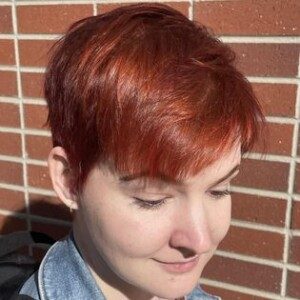
A client of Demi’s
Often, an autistic person does not “outgrow” a sensory issue.
While some autistic adults do perfectly okay in the setting of a typical hair salon, many others find the noise, multiple conversations and scents uncomfortable, even overwhelming.
However, for those who can simply tune these stimuli out without a problem, there may still be another heavy issue looming over them: feeling obligated to participate in small-talk with their stylist.
This can be especially cumbersome if the stylist is a stranger vs. one who’s done their hair before.
“Autistic adults are one of the forgotten demographics,” says Demi.
“In the ways media and stereotypes have portrayed autism, they almost act as if it’s a childhood illness.
“Even teenagers and adults are questioned by the general public for ‘being autistic’ if they are not high-needs or non-speaking presenting. Forced masking is to blame for a lot of this.
“As we are often forgotten about in most spaces, this includes hair salons.
“Adults will usually get their hair cut more often than kids, and the industry as a whole really has no idea how sensory-offensive most salons and beauty spaces can be.
“The overwhelm of sounds in particular. Most full salons have between four and 12 chairs.
“I worked at one in the suburbs years ago that had 18 stylists. That’s a lot of blow dryers going off and conversations happening.
“On the other hand, a lot of neurotypical people (well-meaning or not) tend to infantilize us quite a bit.
“I experience this on a daily basis once my mask drops or I tell someone I’m autistic.
“Having a space geared towards autistic adults, run by neurodivergent people, gives the opportunity to skip all of that.
“I speak to my clients like they are my dear friends (some of them are), and anything less would be disrespectful and uncomfortable for them.”
Demi operates her business entirely on her own. Whatever your or your child’s sensory or other needs, she will make sure that they are met – including the use of low-scented products.
In fact, if you want to just sit silently throughout the entire session with your eyes closed, or, if you want to hum or engage in stimming behaviors (as long as they don’t mechanically interfere with the service) during your hair cut, extension placing or coloring – you will be fully welcome to do so.
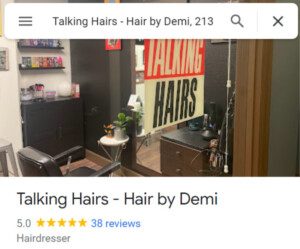
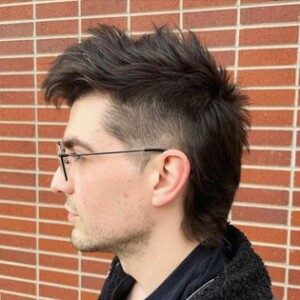
A client of Demi’s
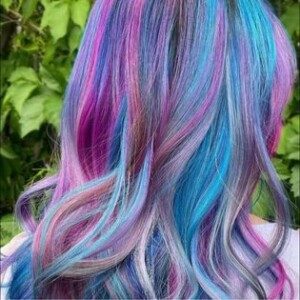
A client of Demi’s
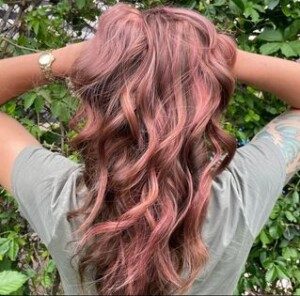
A client of Demi’s
Built-in Accommodations You Can Feel Good About
• Talking Hairs provides fidget toys and adjustable lighting.
• Consultations prior to appointments can be done via text and include discussions about sensory accommodations.
• The studio is on the first floor.
• There is no pressure to conform to social norms, though a little conversation is optional for those who prefer this.
Demi welcomes info-dumps about special interests! “I love learning new things and learning about the special interests of others and why they love them!
“It creates an amazing bond between the two of us, and gives us something interesting to talk about.
“I get to know them, and they can feel comfortable by talking about the things they know and love.
“Oftentimes I will bring it up in the first 20 minutes of a service, and ask them what they study or do for fun, and what types of things deeply interest them. I can’t say I’ve had anyone pass the question up!”
• If you want to avoid eye contact, there will be no judgement; Demi does not make eye contact for most of the time.
• She welcomes clients with AAC devices or other alternative means of communication.
• Earplugs are provided.
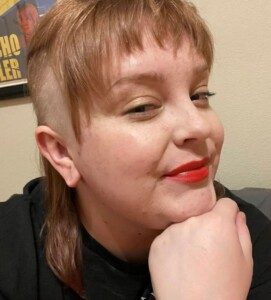 Demi Rivera, a licensed cosmetologist, owns and operates Talking Hairs, a Denver, CO hair salon that accommodates autistic, other neurodivergent and neurotypical adults and children. Demi makes accommodations to fit each client’s individual sensory needs. Follow her on Instagram: @talking_hairs.
Demi Rivera, a licensed cosmetologist, owns and operates Talking Hairs, a Denver, CO hair salon that accommodates autistic, other neurodivergent and neurotypical adults and children. Demi makes accommodations to fit each client’s individual sensory needs. Follow her on Instagram: @talking_hairs.
 Lorra Garrick has been covering medical and fitness topics for many years, having written thousands of articles for print magazines and websites, including as a ghostwriter. She’s also a former ACE-certified personal trainer. In 2022 she received a diagnosis of Level 1 Autism Spectrum Disorder.
Lorra Garrick has been covering medical and fitness topics for many years, having written thousands of articles for print magazines and websites, including as a ghostwriter. She’s also a former ACE-certified personal trainer. In 2022 she received a diagnosis of Level 1 Autism Spectrum Disorder.
.









































